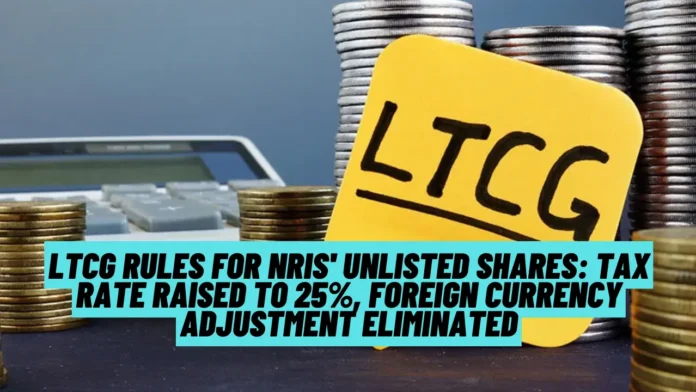The Indian government has announced significant changes to the long-term capital gains (LTCG) tax rules for non-resident Indians (NRIs) holding unlisted shares. Effective immediately, the tax rate on these gains has been increased, and the provision for foreign currency adjustment has been removed. Here are the key details and implications of these changes:
Tax Rate Hike
The tax rate on long-term capital gains from unlisted shares for NRIs has been increased to 25%. This marks a substantial hike from the previous rate, which aimed to bring more uniformity and align the tax policies with other forms of income from investments.
Removal of Foreign Currency Adjustment
Previously, NRIs could benefit from a foreign currency adjustment to account for currency fluctuations over the investment period. This provision allowed NRIs to adjust the purchase price of their shares according to the exchange rate prevailing at the time of acquisition and sale, potentially reducing the taxable gains. With the new rules, this adjustment has been eliminated, which could lead to higher taxable gains for NRIs, especially in the context of currency depreciation.
Implications for NRIs
- Increased Tax Liability: The immediate effect of the changes is a higher tax liability for NRIs on the sale of unlisted shares. The removal of foreign currency adjustment means that gains calculated for tax purposes will likely be higher, as they will not account for currency depreciation.
- Investment Decisions: These changes may influence NRIs’ investment decisions, potentially making other investment avenues more attractive due to lower tax implications.
- Compliance and Reporting: NRIs will need to be more diligent in their tax filings and ensure that their capital gains are reported accurately under the new rules.
Government’s Rationale
The government’s decision to increase the tax rate and remove the foreign currency adjustment is part of a broader strategy to streamline tax policies and increase revenue. By aligning the tax treatment of different forms of income and removing certain adjustments, the government aims to simplify the tax structure and reduce potential avenues for tax avoidance.
Expert Opinions
Tax experts have mixed views on these changes. While some believe that the higher tax rate could discourage investment in unlisted shares by NRIs, others argue that the impact might be limited given the overall growth potential of the Indian market. Additionally, the removal of the foreign currency adjustment is seen as a step towards a more straightforward and transparent tax regime.

